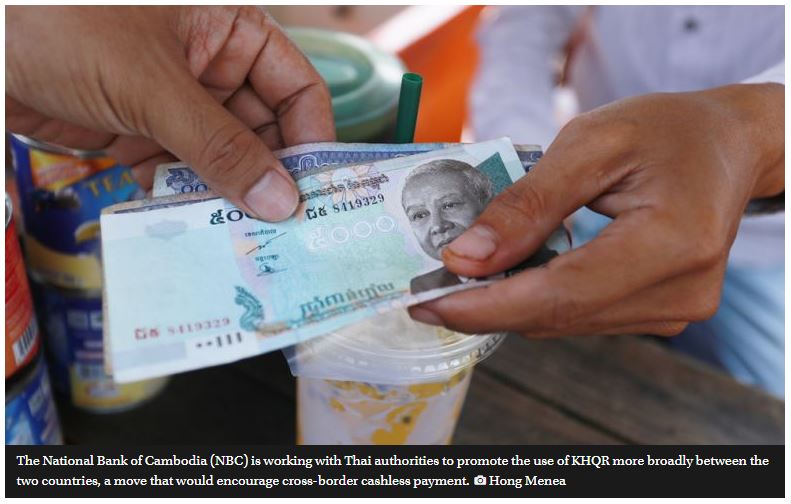Cambodia, Thailand up cross-border KHQR code transactions
The National Bank of Cambodia (NBC) is working with Thai authorities to promote the use of KHQR more broadly between the two countries, a move that would encourage cross-border cashless payment.
KHQR is a universal quick response (QR) code system created for retail payments in the Kingdom and cross-border payments within the ASEAN bloc, according to the central bank.
NBC assistant governor and director-general Chea Serey told The Post on July 17 that both central banks launched the cross-border QR payment in February 2020. However, as an unintended consequence of Covid-19 border restrictions, the volume of KHQR code-based transactions has remained limited, she said.
Presently, transactions can only be done between ACLEDA Bank Plc and Siam Commercial Bank (SCB) clients, she added.
“It is not universal yet. But, currently we are in discussion to allow all KHQR users to use their mobile app to pay with SCB merchants as well.
“In Thailand, not all merchants can accept KHQR. Only SCB merchants can. We hope that with Thailand QR standardisation adoption, we will be able to allow our KHQR users to pay at all Thai-QR merchants regardless of their issuing banks,” Serey said.
In addition, transactions are outbound only, meaning that Cambodians can pay in Thailand but Thai tourists cannot pay in Cambodia as of yet, she said, adding that the inbound service is currently in progress.
“Most importantly, we want to encourage the use of KHR. So, only if the users have a KHR account can they use this cross-border method of payment.
“Therefore, I encourage everyone to open a KHR account if they want to benefit from this experience.
“Non-KHR users may complain and find it inconvenient but it is exactly the intention to provide more incentive and convenience to KHR users,” she added.
promoting investment in the agri-food sector.
The ambassador noted that Australia is a big supporter of the agricultural industry, which he referred to as the backbone of the Cambodian economy.
Noting that the annual growth rate of foreign direct investment (FDI) in Cambodia’s agricultural sector has remained low at about four per cent, Kang hailed AFID as an exemplification of Australia’s contributions to the Kingdom’s efforts to attract and maintain investment in agriculture, agribusiness and agri-food.
Meanwhile, Minister of Agriculture, Forestry and Fisheries Veng Sakhon underlined that the agricultural sector has been growing, and producing food in excess of domestic demand.
Progress in the sector is “encouraging and inspiring” the private sector and development partners to invest in processing industries to enable the sustainable use of domestic raw materials, increase value-added, improve quality, hygiene and safety standards, and increase competitiveness, he said.
“The launch of AFID reflects our efforts to facilitate and resolve issues related to the facilitation of agri-food investment, as well as help the agro-industrial sector,” the minister said.
He added that AFID would “help in our work from now on” and support the implementation of “The Strategic Framework and Programmes for Economic Recovery in the Context of Living with Covid-19 in a New Normal 2021-2023”, a comprehensive roadmap to safely guide the economy as the novel coronavirus becomes endemic.
Having said that, Sakhon noted that “only two to 10 per cent” of agricultural products are processed, highlighting that the private sector still faces a host of challenges that need to be jointly addressed, such as power supply and logistics instabilities, and a lack of warehousing and cold storage facilities as well as drying silos.
“They do not meet the actual demand. This must be addressed in a timely and effective manner,” he said.
At the launch of AFID, Hun Lak, CEO of Rich Farm Asia Ltd, reiterated that Cambodia has problems with high production costs and a shortage of skilled labour, which require the government’s consideration.
“In order to woo local and foreign investors to invest in this sector, it is necessary to have better local infrastructure and training for skilled workers,” he said.
Between its inception in 1994 and June 30, CDC approved about 400 investment projects in agriculture, agro-industry and food processing with a total value of $10.33 billion.
Source: https://www.phnompenhpost.com/business/cambodia-thailand-cross-border-khqr-code-transactions


 English
English




